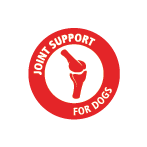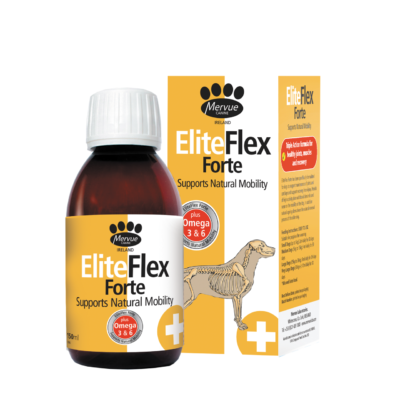- +353 21 422 0397
- info@mervue.ie
- Mon - Fri: 09:00 - 17:00

 As many as 20% of dogs greater than one year of age are thought to be affected by arthritis, with the hips, elbows and knees being the most commonly affected joints.
As many as 20% of dogs greater than one year of age are thought to be affected by arthritis, with the hips, elbows and knees being the most commonly affected joints.
Arthritis is the medical term used to describe joint inflammation. In arthritis, the bone, cartilage and the joint fluid are affected and inflamed. As with humans, arthritis and joint wear and tear is more common in older dogs. Obesity also can increase the likelihood of a dog developing arthritis.
The signs of arthritis in dogs are often initially subtle but become more pronounced as the disease progresses and the joints become more painful.
Signs that suggest that your dog may suffer from dog arthritis include: 
Arthritis in dogs is often quite advanced by the time it is diagnosed; however, the early signs of arthritis may be very subtle behavioural changes or may be incidentally picked up during a veterinary examination. The earlier arthritis is detected the more likely that therapeutic interventions will be helpful. Many dogs will require anti-inflammatory drugs to help to control the pain and inflammation, but there are several other things that owners can do to assist their dogs with arthritis and mobility issues.
In the early stages of dog arthritis, dogs may benefit from nutritional supplementation and in advanced cases nutritional supplements in conjunction with painkillers will also benefit dogs. Weight control has been demonstrated to have a very positive effect on the management of arthritis in obese dogs.
 ELITEFLEX FORTE for Dogs contains several elements which are beneficial to joints. Glucosamine and chondroitin are the building blocks of cartilage and supplementation may help to repair damaged cartilage. Vitamins E and C are antioxidants and will help to counteract the oxidative damaged caused by inflamed and dying cells in the joints. Hyaluronic acid is an important component of joint fluid and contributes to the lubrication and thickness of the joint fluid. Arthritic joints often have decreased amounts of hyaluronic acid because of inflammation. MSM (methylsulfonylmethane) is a natural sulfur-containing compound produced by kelp in the ocean and is reported to have an anti-inflammatory effect as well as an effect on increasing the strength of the ligaments, tendons and joint capsule that surrounds the joints. ELITEFLEX FORTE for Dogs also contains the omega 3 and omega 6 fatty acids which have been demonstrated to be of benefit in dogs with arthritis.
ELITEFLEX FORTE for Dogs contains several elements which are beneficial to joints. Glucosamine and chondroitin are the building blocks of cartilage and supplementation may help to repair damaged cartilage. Vitamins E and C are antioxidants and will help to counteract the oxidative damaged caused by inflamed and dying cells in the joints. Hyaluronic acid is an important component of joint fluid and contributes to the lubrication and thickness of the joint fluid. Arthritic joints often have decreased amounts of hyaluronic acid because of inflammation. MSM (methylsulfonylmethane) is a natural sulfur-containing compound produced by kelp in the ocean and is reported to have an anti-inflammatory effect as well as an effect on increasing the strength of the ligaments, tendons and joint capsule that surrounds the joints. ELITEFLEX FORTE for Dogs also contains the omega 3 and omega 6 fatty acids which have been demonstrated to be of benefit in dogs with arthritis.
ELITEFLEX FORTE for Dogs is available in paste and liquid formulations. The liquid formulation should be mixed into wet food. The paste formulation can be administered either directly into food or smeared on the dogs’ lips or feet, so they lick it off.
Environmental changes
 In all cases of arthritis in dogs it is enormously beneficial for the dog to modify its environment to minimise the demands made on painful joints. Examples of environmental modification include introducing soft beds and placing them near radiators; considering ramps to facilitate the dog accessing its favourite sleeping place (e.g. the couch); considering the placement of food and water bowls to minimise jumping, reducing; moderating exercise to a little and often regime (arthritic dogs should never be exercised to the point of exhaustion or lameness) and undertaking more frequent grooming, cleaning and nail cutting.
In all cases of arthritis in dogs it is enormously beneficial for the dog to modify its environment to minimise the demands made on painful joints. Examples of environmental modification include introducing soft beds and placing them near radiators; considering ramps to facilitate the dog accessing its favourite sleeping place (e.g. the couch); considering the placement of food and water bowls to minimise jumping, reducing; moderating exercise to a little and often regime (arthritic dogs should never be exercised to the point of exhaustion or lameness) and undertaking more frequent grooming, cleaning and nail cutting.